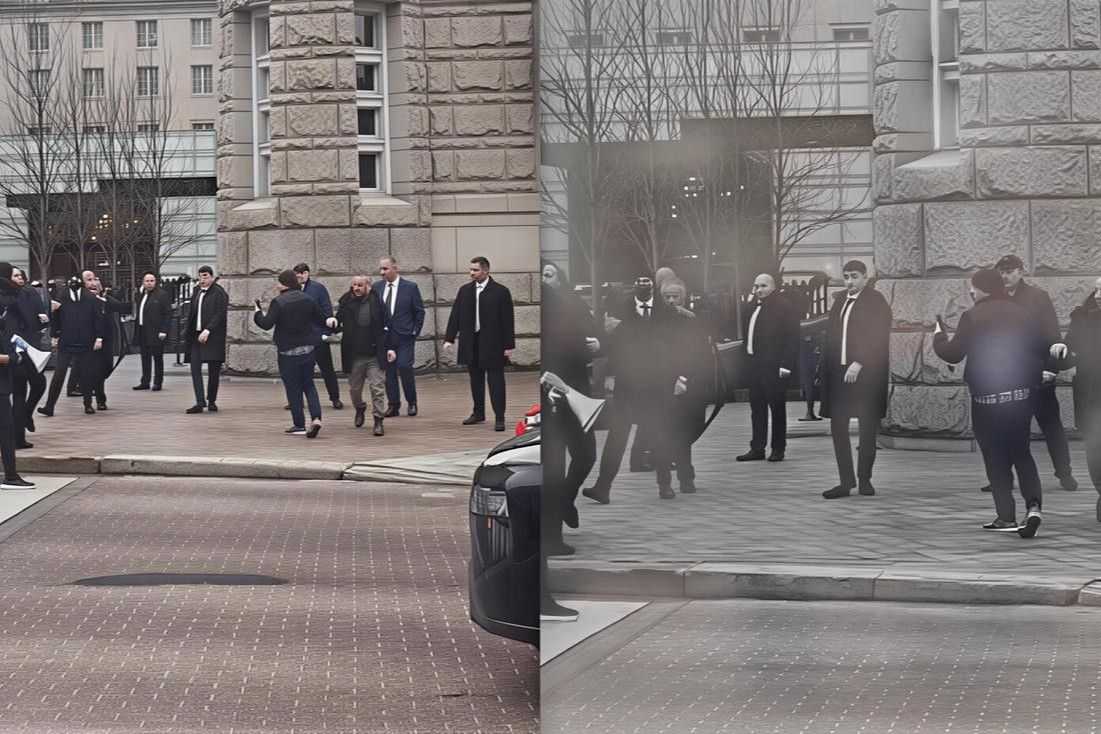As conflict with Russia deepens, Azerbaijani pro-government media openly criticises the Kremlin

Following the deaths of two ethnic Azerbaijanis that reportedly occurred during a Russian police raid in Yekaterinburg, relations between Moscow and Baku have deteriorated, illustrated by an increasingly harsh criticism of Russia in Azerbaijani pro-government media.
The extent of Baku’s official reaction to the incident is currently unknown, but Azerbaijani authorities have already arrested three Russian journalists in the country, two of whom are accused of working for Russian intelligence, as well as cancelling all cultural events.
On Tuesday, Azerbaijan announced it was launching a criminal investigation into the deaths, and directly accused Russian law enforcement of ‘torture and murder with extreme cruelty’.
Meanwhile, the spat continued to play out in Azerbaijani media.
An article in Caliber on 29 June cast the violent episodes as being the latest in a centuries-long history of ‘Russian traditions: chauvinism, and discrimination based on ethnicity, religion, and race’.
‘It’s important to remember that Russia has, for centuries, shown disdain for the rights of other nations — from the tsarist era to the Soviet Union and into today’s modern Russia’.
The article went on to connect the events in Yekaterinburg to Russia’s full-scale invasion of Ukraine, arguing that the war is ‘merely the tip of the iceberg’ of Moscow’s imperialist chauvinism.
‘The Kremlin is ruthlessly erasing everything tied to Ukrainian identity. The mass bombings of civilian cities and widespread deportations make it clear that Moscow does not recognise other nations’ right to independent existence. And if this is how Russia treats Ukrainians — a people with whom it shares religion, language, and centuries of intertwined history — then it is hardly surprising that its policies toward the peoples of Central Asia and the Caucasus (both North and South) are even more brutal’.
The pro-government media outlet APA also published an article in a similar vein under the title, ‘Yekaterinburg Horror: Chauvinism and ethnic discrimination become state policy in Russia’.
The article claimed that Russia’s ‘racist and chauvinist policies are not only deepening but have also taken on an extreme form. In order to suppress internal dissent and strengthen totalitarian control, the Kremlin has chosen non-Russian peoples and migrants as scapegoats’.
Other analysts argued that the Yekaterinburg crackdown was a manifestation of how Russia is uncomfortable with the increasing confidence of its former colonial subjects — such as Azerbaijan and Kazakhstan.
In an interview with Azerbaijani pro-government outlet Aze.media, Kazakh activist Arman Shoraev asserted that ‘Russia cannot come to terms with the fact that former Soviet republics, once entirely dependent on Moscow, can now act independently. What enrages Russia is that Azerbaijan defended its independence and, after nearly 30 years, reclaimed its territories’, referring to Nagorno-Karabakh.
Another recent article in Aze.media connected the police violence to an earlier episode that is widely believed to have set off the downturn of Azerbaijani–Russian relations — the deadly Azerbaijan Airlines crash in December 2024, which Baku has blamed Moscow for causing and has repeatedly called for an admission of guilt.
‘The problem is, the Moscow chattering class [...] simply didn’t expect such a firm and principled response from Azerbaijan [to the plane crash]’, the article argued.
‘They assumed Baku would accept the Russian version, bury its dead, and make no demands. They miscalculated. They were wrong. And now they’re throwing tantrums on social media — spitting insults and frothing at the mouth. Most importantly — they can’t even articulate their demands. Admitting that they’re driven by jealousy over Azerbaijan’s independent policy would be too revealing. So they try to twist the facts. Or rather, they’re trying to stuff the imperialist “frog” back onto the globe — with predictable results’.
Russian media hits back
Russian officials and media officials quickly took Azerbaijan to task for its arrest of the journalists and cancellation of cultural events.
Foreign Ministry spokesperson Maria Zakharova called the detentions ‘unlawful’ and ‘hostile’, while Dmitry Kiselyov, the head of Russia Today, decried how the arrested journalists were treated ‘as though they are terrorists’.
Separately, Kremlin spokesperson Dmitry Peskov took a softer approach, saying that he hoped the situation would be resolved diplomatically. Nonetheless, he also criticised what he called an ‘extremely emotional reaction’ from Baku.
Russian print media also discussed the deteriorating relations with Azerbaijan.
From today’s Russian papers: “On the ruins of the former USSR one more hostile state has revealed itself…our ‘partners’ there are ready to open a ‘second front’ against us..” In today's #ReadingRussia Moscow's relations with post Soviet states. pic.twitter.com/NuIl5YHyhk
— Steve Rosenberg (@BBCSteveR) July 1, 2025
Meanwhile, popular pro-Russian social media accounts dismissed Baku’s outrage, as well as playing down the seriousness of the Yekaterinburg incident itself.
Honestly, at this point, the problem of Azeri organized crime in Russia should not just be tackled by police, but also by FSB and military counter-intelligence. Azerbaijan is a NATO client state, supplies mercenaries and military supplies to the Kiev regime and lets Israel use… https://t.co/Lmbl0TEapO
— Russians With Attitude (@RWApodcast) June 30, 2025
Others spread conspiracy theories, particularly focused on allegations — which Baku has denied — that Israel used Azerbaijani territory to attack Iran, which is a close ally of Russia. Some even suggested, without providing any evidence, that the West is attempting to force Azerbaijan to start a war with Russia and Iran.











